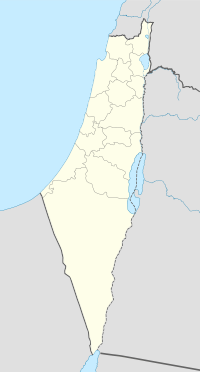Julis (District of Gaza)
| Julis | |
|---|---|
| Arabic | جولس |
| Name meaning | personal name |
| Subdistrict | Gaza |
| Coordinates | 31°40′54″N 34°39′13″E / 31.68167°N 34.65361°ECoordinates: 31°40′54″N 34°39′13″E / 31.68167°N 34.65361°E |
| Palestine grid | 117/121 |
| Population | 1,030 (1945) |
| Area | 13,584 dunams 13.6 km² |
| Date of depopulation | June 11, 1948 |
| Cause(s) of depopulation | Military assault by Yishuv forces |
| Current localities | Hodaya |
Julis (Arabic: جولس) was a Palestinian Arab village in the Gaza Subdistrict, located 26.5 kilometers (16.5 mi) northeast of Gaza on a slight elevation along the southern coastal plain. In 1945, there were 1,030 inhabitants in the village. It was depopulated during the 1948 Arab-Israeli War.
Julis was built on an archaeological site whose ancient name is unknown.Potsherds from the Mamluk era have been found in the village. The village had a Maqam which was constructed with ancient materials.
Julis was incorporated into the Ottoman Empire in 1517 with the rest of Palestine, and by 1596 it was part of the nahiya of Gaza, in the Liwa of Gaza. It consisted of 204 persons (79 households) and paid taxes on wheat, barely, fruit, beehives, vineyards and goats.
In 1863 Victor Guérin found the village to be located on a hillock and containing five hundred inhabitants. It had a oualy, dedicated to Scheik Mohammed, was internally decorated with two fragments. An Ottoman village list of about 1870 indicated 101 houses and a population of 307, though the population count included only men.
In 1882, the Palestine Exploration Fund's Survey of Western Palestine described Julis as mostly built of adobe brick structures, and it had a well to the south, and a pool surrounded by gardens to the northeast.
In the 1922 census of Palestine, conducted by the British Mandate authorities, Jules had a population of 481 inhabitants, all Muslims, increasing in the 1931 census to 682, still all Muslims, in 165 houses.
...
Wikipedia

